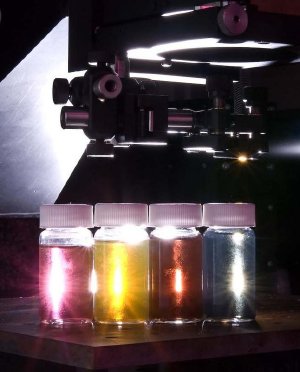Jan 20 2010
The Laser Zentrum Hannover e.V. (LZH) is coming out big in 2010 with ultrapure nanoparticles for medical applications. One example are LZH nanoparticle exponants that can currently be seen at the new "Center for New Technologies" (ZNT) at the Deutsche Museum in Munich. Also, in 2010 the LZH will host the first international conference on the generation of ultrapure nanoparticles.
 Ultrapure nanoparticles which are generated in liquids have an antibacterial effect in a medical implant (Photo: Kris Finn).
Ultrapure nanoparticles which are generated in liquids have an antibacterial effect in a medical implant (Photo: Kris Finn).
At the end of November, 2009, the ZNT at the Deutsche Museum opened its gates for the public with the exhibition "Nano- and Biotechnology." The nanoparticles exhibited by the LZH are imbedded in a liquid as carrier material, as well as in synthetic materials, which are used for medical implants. "This ensures that the surfaces of the implants are anti-bacterial and that infections can be prevented," explains Andreas Schwenke, scientist at the LZH. In contrast to the present discussions concerning 'nano-silver' in washing machines etc., the dose is so "fine-tuned", that the release of nanoparticles cannot even be measured. The nanoparticles simply offer surface protection."
Further, the international conference ANGEL 2010 will be held from June 29 to July 1, 2010 in Engelberg, Switzerland, with the main goal of presenting bundled research results. ANGEL 2010 stands for "Laser Ablation and Nanoparticle Generation in Liquids", and its main topic is the generation of ultrapure nanoparticles from solids immersed in fluids. The conference is organized by the European Optical Society (EOS) in partnership with the Laser Zentrum Hannover e.V. (LZH) and the University of Tokyo. The program is coordinated by Dr. Stephan Barcikowski from the LZH and Prof. Fumitaka Mafuné from the University of Tokyo.
High-ranking invited speakers will report about the current research results and trends in development. Also, they will highlight the fields of applications in nano-medicine, optics, biophotonics, and electronics. The call for papers ends on February 26, 2010. In addition, the conference will be offering a prize for junior-researchers.
"We are very active in this field," says Barcikowski. "Participation in the exhibition in Munich as well as the conference in Switzerland show that ultrapure nanoparticles play a very important role at the LZH."